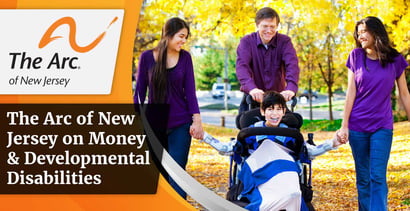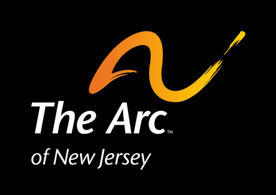

In a Nutshell: The Arc of New Jersey is an organization with a mission to promote and protect the human rights of individuals with intellectual and developmental disabilities. This includes providing resources, guidance, and advocacy to the families of the individuals as well. An important part of this process is helping families navigate the high costs that can accompany caring for a person with a disability. The Arc of New Jersey Family Institute is the go-to resource hub for families in New Jersey to learn how to handle these issues. The Arc of New Jersey also helps individuals prepare to become members of the workforce and chart a life course through its Project HIRE and Planning for Adult Life programs.
Caring for a child or family member with intellectual or developmental disabilities can be an emotional, loving, challenging, and alienating journey. Each household situation is unique, and parents and caretakers at times may not know where to turn for help.
In addition to learning how to care for a loved one with special needs by meeting basic needs like food, shelter, and socialization, many families also face unexpected financial hardships along the way.
 Almost 6.5 million people in the U.S. live with some level of intellectual disability, and about 545,000 of those are between the ages of 6 and 21, according to healthychildren.org. Despite the distinct challenges and isolation that can come with caring for someone with an intellectual disability, caretakers should know they are not alone.
Almost 6.5 million people in the U.S. live with some level of intellectual disability, and about 545,000 of those are between the ages of 6 and 21, according to healthychildren.org. Despite the distinct challenges and isolation that can come with caring for someone with an intellectual disability, caretakers should know they are not alone.
And The Arc of New Jersey is one of the organizations working hard to make sure children with developmental disabilities and their families have a place to turn to for support. The nonprofit is part of The Arc nationwide network, but the New Jersey chapter actually predates the national organization by one year.
“We happen to be celebrating our 70th anniversary this year, which is a big milestone,” said Celine Fortin, Associate Executive Director of The Arc of New Jersey.
Fortin said The Arc of New Jersey was founded by families who were struggling to raise children who had intellectual and developmental disabilities and they decided to pull together to help each other share knowledge and resources.
“Back 70 years ago, there were really no choices for people with disabilities other than to put the person in an institution,” she said. “There were no support services or anything to help the families.”
Today, The Arc provides a plethora of support services for people with intellectual or developmental disabilities and their families.
We spoke with Fortin specifically about how The Arc of New Jersey can assist families who are facing the financial challenges that can accompany caring for a loved one with a developmental disability.
The Arc of New Jersey Family Institute is the Primary Hub for Family Members to Learn About Resources
The mission of The Arc of New Jersey is to promote and protect the human rights of individuals with intellectual and developmental disabilities.
The organization “actively supports their full inclusion and participation in the community throughout their lifetimes; and is committed to enhancing the quality of life of those individuals and their families through advocacy, empowerment, education, and prevention.”
With family support built right into The Arc’s mission, the nonprofit established The Arc of New Jersey Family Institute to help guide families to valuable tools and resources necessary to navigate their journeys.

The Arc of New Jersey Family Institute provides a wide range of resources to families seeking guidance in caring for a child with intellectual or developmental disabilities.
Fortin said the Family Institute is the first place to go for families who are struggling with questions like where to turn for certain services, how to go about getting services, and even questions like eligibility requirements and how to fill out applications.
She said helping families understand the financial considerations that accompany their situations is another major component of the Family Institute’s guidance.
“Unfortunately, the way the system is set up is that it necessitates the person pretty much be living in poverty — or not having a lot of money to their name — and having to figure out a really complicated financial setup to protect assets for the future,” Fortin said.
She said this can be made even more difficult because these financial considerations have to be dealt with while also ensuring the family maintains eligibility for assistance.
“That’s one of the biggest concerns and an area where people call us about the most,” Fortin said. “Because, if it’s not taken care of correctly, the person is in danger of losing all the supports and services that would help them live independently in the community.”
Overall, the main goal is to get timely and accurate information to families and helping them navigate the system, and if necessary, advocating on their behalf, she said.
Project HIRE Helps Individuals Participate in the Community, Earn Money, and Realize Their Potential
“Our Project HIRE program was the first supported employment program in the state of New Jersey — it was started in 1985,” Fortin said. “And it was during a time when supported employment was barely a concept that people were even starting to consider.”
The goal of the program is to help people with intellectual or developmental disabilities who are able and want to work find gainful employment in the community just like anybody else, she said.

Project HIRE assists adults with disabilities in finding gainful employment, benefitting the individual, employers, and society.
“Project HIRE is accredited for Community Employment Services and School Transition Services by the Commission for the Accreditation of Rehabilitation Facilities (CARF),” according to the organization website. “Project HIRE is also a Medicaid Approved Service Provider.”
Not only does Project HIRE assist adults with finding and maintaining employment, but it also assists middle and high school students in preparation for transitioning into adult life with its School-to-Work program.
“Project HIRE has joined with hundreds of employers and assisted thousands of people with disabilities in finding successful, independent employment,” according to the website. “Program services include: vocational assessments, job matching, job sampling, on-site job training, travel training and follow-along services.”
The program offers benefits for individuals seeking jobs and employers.
“Individuals benefit from having the opportunity to earn a competitive wage, become a contributing, tax-paying member of society, and realizing self-worth, esteem, and independence that comes from having a job,” according to the organization.
For employers, hiring individuals with disabilities helps to ensure a diversified workforce, and they tap into a group of people “who are highly motivated, punctual, and often out-distance other workers in job performance,” according to the website.
The community benefits as well, as members of a demographic that previously relied largely on publicly funded programs become tax-paying members of the labor force.
The Planning for Adult Life Program Assists Young People with Developmental Disabilities
The Arc of New Jersey also leads the Planning for Adult Life Program, which helps young adults with developmental disabilities and their families chart a life course as they begin preparing for adulthood.
It is a statewide project funded by the New Jersey Division of Developmental Disabilities.
The program offers a variety of resources, including informational sessions, webinars, and resource guides and materials that address several core areas, including financial planning, employment, postsecondary education, building and maintaining community ties and friendships, and planning and visioning a life course.

As individuals with disabilities approach adulthood, the program Planning for Adult Life helps chart out a life course for them and their families.
“The transition planning process is evaluating the students’ skills, abilities, strengths, challenges, preferences to envision their life after leaving school,” according to the website. “Planning involves setting goals for the student to strive toward and identifying the needs for support.”
The organization lays out a game plan for individuals to follow with the help of the program and other support systems.
Step 1 is to develop a transitional team, ideally composed of the student, family, school personnel, community members, and state agencies. Next, the team researches options and seeks advice from the organization’s Core Planning Areas.
Next, the organization recommends to draft a transition plan, implement the plan, and evaluate the progress.
“All or most services are provided by or arranged through the school district at no cost to the family and there is a single service delivery system or place where services flow to the student,” according to the program website.
The Planning for Adult Life Program offers free presentations, hands-on workshops, and other resources for schools, parent groups, community groups, and professional organizations.
“Our standard presentation is approximately 45 minutes long and includes a brief introduction to the PFAL program, presented by one of our staff,” according to the website. “However, we are happy to accommodate special presentation requests with advance notice.”
Families Experiencing Financial Difficulties are Encouraged to Reach Out
Fortin emphasized just how important it is for families in need of guidance — financial or otherwise — to reach out to The Arc of New Jersey.
“Call us as soon as possible,” she said. “Sometimes there are ways we can give them advice they can act on or there may be ways that we might be able to advocate on their behalf with some government entities to put a plan in place that will help protect their assets while keeping their services in place.”
Caring for a person with an intellectual or developmental disability can cause very real financial strains, she said. That’s why it’s extremely important for families to ask for help before they get into a financial position that may be nearly irreversible due to the continuing costs of care.
Advertiser Disclosure
BadCredit.org is a free online resource that offers valuable content and comparison services to users. To keep this resource 100% free for users, we receive advertising compensation from the financial products listed on this page. Along with key review factors, this compensation may impact how and where products appear on the page (including, for example, the order in which they appear). BadCredit.org does not include listings for all financial products.
Our Editorial Review Policy
Our site is committed to publishing independent, accurate content guided by strict editorial guidelines. Before articles and reviews are published on our site, they undergo a thorough review process performed by a team of independent editors and subject-matter experts to ensure the content’s accuracy, timeliness, and impartiality. Our editorial team is separate and independent of our site’s advertisers, and the opinions they express on our site are their own. To read more about our team members and their editorial backgrounds, please visit our site’s About page.

